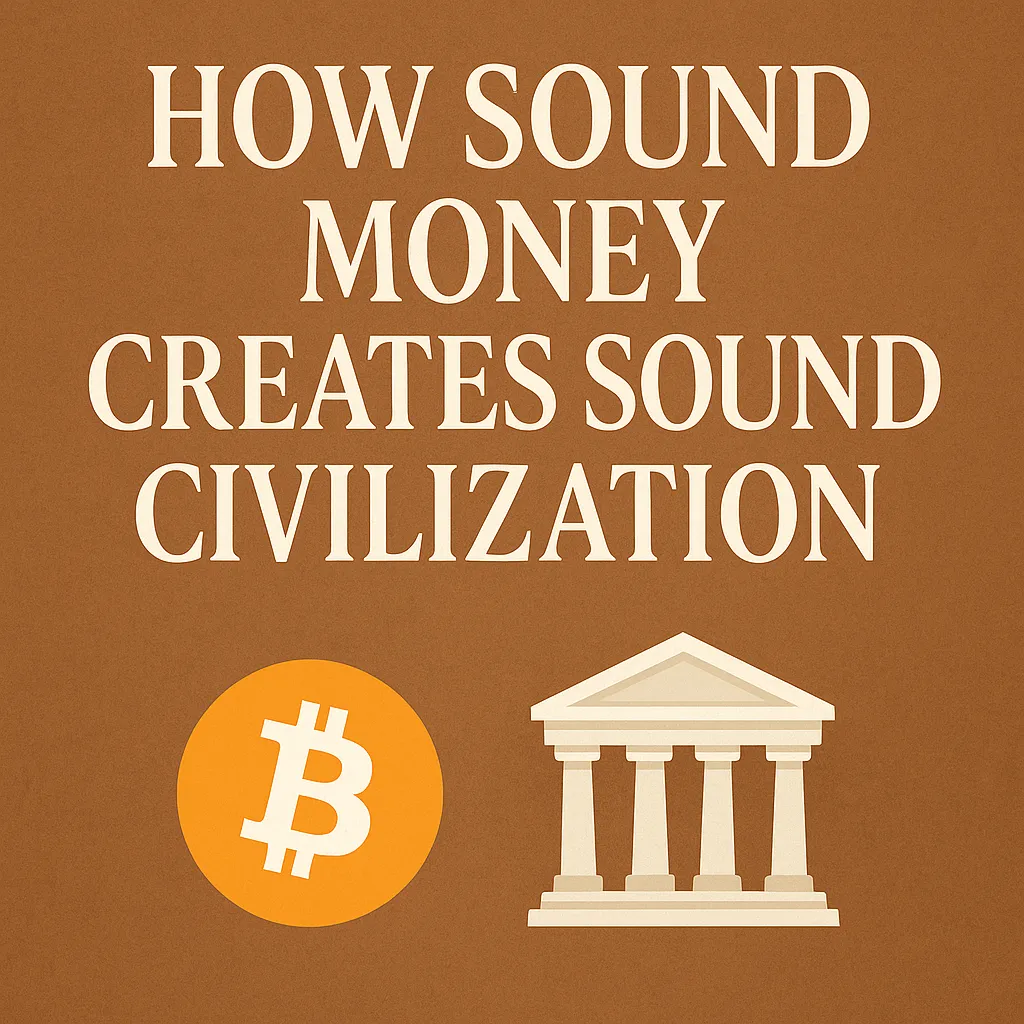
How Sound Money Creates Sound Civilization
At first glance, money might seem like a neutral tool—a medium of exchange, a way to store value, a unit of account. But look deeper, and you’ll find that money isn’t just an economic tool. It’s a moral foundation. It shapes how people behave, how societies plan for the future, and how civilizations rise—or fall.
Throughout history, the health of a society has closely mirrored the health of its money. When the money is sound—scarce, honest, incorruptible—people build, save, and think long-term. But when money becomes unsound—easily printed, centrally manipulated, or politically weaponized—those virtues collapse.
This is more than a historical curiosity. It’s the very reason Bitcoin matters.
What Makes Money “Sound”?
Sound money is money you can trust. Not because a central bank promises it, but because it is grounded in fixed rules and scarcity.
Historically, the best examples of sound money were gold and silver—rare, durable, hard to counterfeit, and nearly impossible to inflate at will. Societies that anchored themselves to these forms of money enjoyed stability, low time preference, and generational progress.
Bitcoin is the modern evolution of that concept. With a hard cap of 21 million coins, open-source code, decentralized issuance, and mathematical verification, it’s not just sound money—it’s incorruptible money.
Low Time Preference: The Foundation of Civilization
One of the most underappreciated ideas in economics is “time preference.” It refers to how much people value present consumption over future benefit.
High time preference: “I want it now. I’ll borrow, spend, and indulge. Tomorrow can wait.”
Low time preference: “I’ll delay gratification. I’ll save, build, and invest in the future.”
Sound money lowers time preference. When your money holds value across time, you don’t need to rush into spending. You can plan ahead, build businesses, raise families, and plant trees whose shade you may never sit under.
Easy money does the opposite. Inflation punishes savers, so people spend recklessly. Investment becomes speculation. The future becomes foggy and uncertain. That’s not just bad economics—it’s societal rot.
History’s Warning Signs
Take a look at the final stages of past empires:
Rome debased its silver coinage, eventually filling denarii with more base metals than silver. Economic collapse followed.
Weimar Germany printed itself into hyperinflation, paving the way for social unrest and authoritarianism.
The U.S. abandoned the gold standard in 1971, and since then, prices have exploded, real wages have stagnated, and debt-fueled consumption has replaced productive savings.
These weren’t just monetary accidents. They were civilizational signals—moments when easy money unmoored entire nations from responsibility, truth, and sustainability.

Sound Money Shapes Culture
Money isn’t just a store of value—it’s a store of values. When society is built on money that is honest, scarce, and earned, it encourages virtues:
Discipline — saving over spending
Honesty — working for value rather than manipulating money supply
Responsibility — facing the consequences of your actions
Trust — engaging in voluntary, peer-to-peer exchange
Compare that to a fiat world:
Speculation replaces savings
Bailouts reward failure
Corruption hides behind closed-door monetary policy
Inflation robs people quietly and constantly
Easy money erodes culture from the inside out. It tells you that consequences don’t matter, that short-term gain is all that counts, and that someone else will pick up the tab.
Sound money restores the moral compass.
Bitcoin: A Civilization Reboot
Bitcoin isn’t just a new kind of money—it’s a new kind of foundation.
In a fiat world, where central banks manipulate the supply and inflation steals your purchasing power, Bitcoin introduces clarity, scarcity, and credibility. You know how many coins exist. You know the rules can’t be changed on a whim. You don’t need permission to use it or trust any intermediary.
It invites a civilization to start over—not by tearing down the old, but by building something better from the ground up.
In a world where noise and deception are the norm, Bitcoin is signal. In a time when short-termism is destroying the planet and our families, Bitcoin rewards those who think long-term.
In short, Bitcoin is a civilization-building tool disguised as a currency.
Conclusion: Fix the Money, Fix the World
The phrase may sound like a slogan, but it cuts to the heart of the issue. If you want peace, build sound money. If you want progress, build sound money. If you want people to dream, save, build, and cooperate—start with money they can trust.
Broken money breaks everything else. But sound money? That’s the soil where freedom, truth, and human flourishing can grow.
Bitcoin isn’t perfect. But it is sound money for the digital age—and maybe our last chance to rebuild the foundations of a world worth living in.
Want to go deeper? Download our free guide:
Bitcoin Unlocked: A Guide to Financial Sovereignty
Shout out to BullishBTC.com, where we’re helping orange-pill the world—one reader at a time.



